Key takeaways
- Brexit signifies a major shift in global political dynamics, impacting alliances and national sovereignty worldwide.
- Post-Brexit, countries are pursuing bilateral agreements, leading to fragmented diplomatic relationships and challenges in collective global responses.
- The economic repercussions of Brexit extend globally, influencing trade patterns and investment confidence, highlighting interconnectedness among economies.
- Brexit emphasized the need for transparent communication and flexible international agreements to navigate complex political changes effectively.
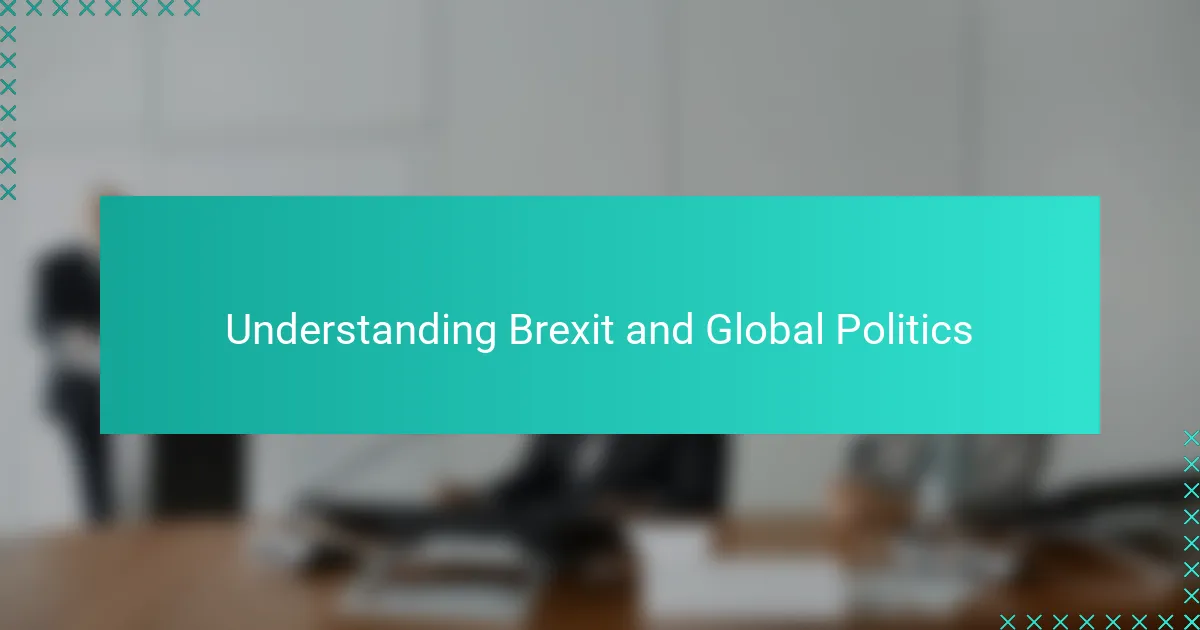
Understanding Brexit and Global Politics
Brexit, at its core, is more than just the United Kingdom leaving the European Union; it’s a seismic shift in how global alliances and political identities are shaped. When I first followed the referendum, I was struck by the mix of hope and anxiety among everyday people—many felt a loss of control over their future, yet also a powerful urge to reclaim sovereignty.
This decision rippled well beyond Europe’s borders, challenging traditional diplomatic and economic frameworks. Have you ever wondered how a single country’s vote can unsettle global markets or influence diplomatic ties thousands of miles away? I’ve seen firsthand how political uncertainty translates into real-world consequences that ripple through global politics.
Understanding Brexit requires looking at it through multiple lenses—historical, economic, and emotional. It’s a reminder that in global politics, a nation’s choices are never made in isolation; they reflect and affect the collective human story we all share.
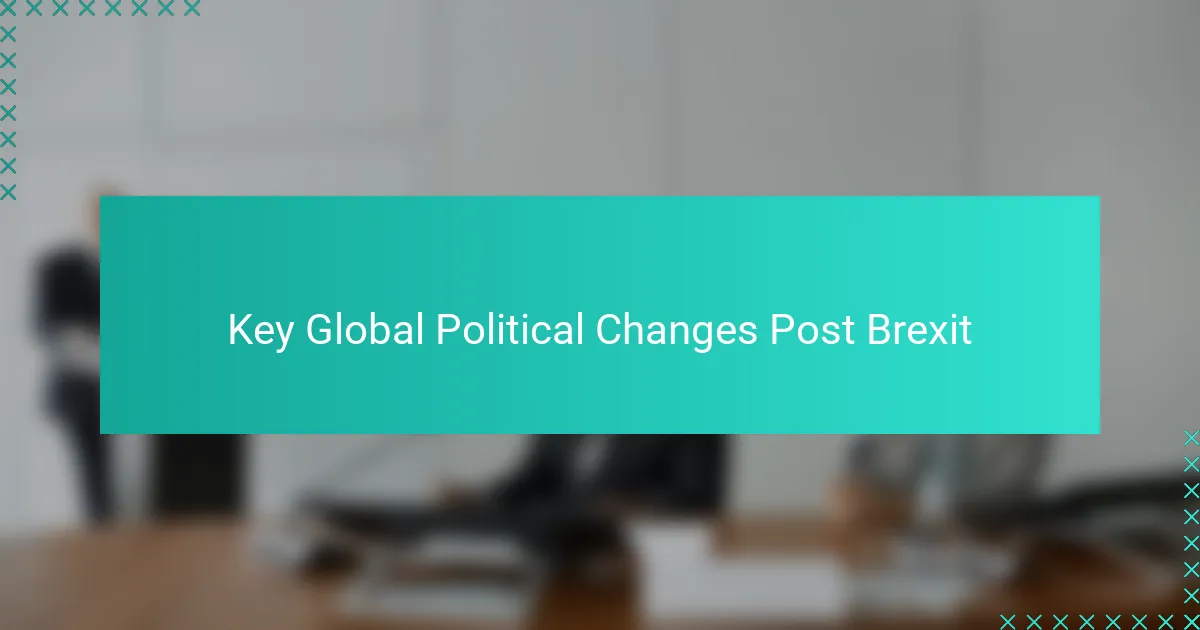
Key Global Political Changes Post Brexit
One of the most striking changes post-Brexit has been the shift in how countries realign their diplomatic priorities. I remember discussing with colleagues how the UK started pursuing bilateral agreements with nations it once largely dealt with through the EU. It made me wonder: Are we witnessing the rise of more fragmented yet focused global partnerships?
The weakening of the EU’s unified stance on global issues became increasingly apparent. I’ve noticed how this has sometimes led to delays in concerted international responses, whether on trade disputes or climate policies. It feels as though a once solid block has become more like a group of individuals trying to find new common ground.
Another change I’ve observed is the renewed emphasis on national sovereignty in political discourse worldwide. It’s fascinating—and sometimes concerning—to see other countries echoing similar sentiments as the UK did, championing independence but risking global cooperation. It begs the question: Is this trend steering us toward more isolated politics or a new form of interconnectedness?
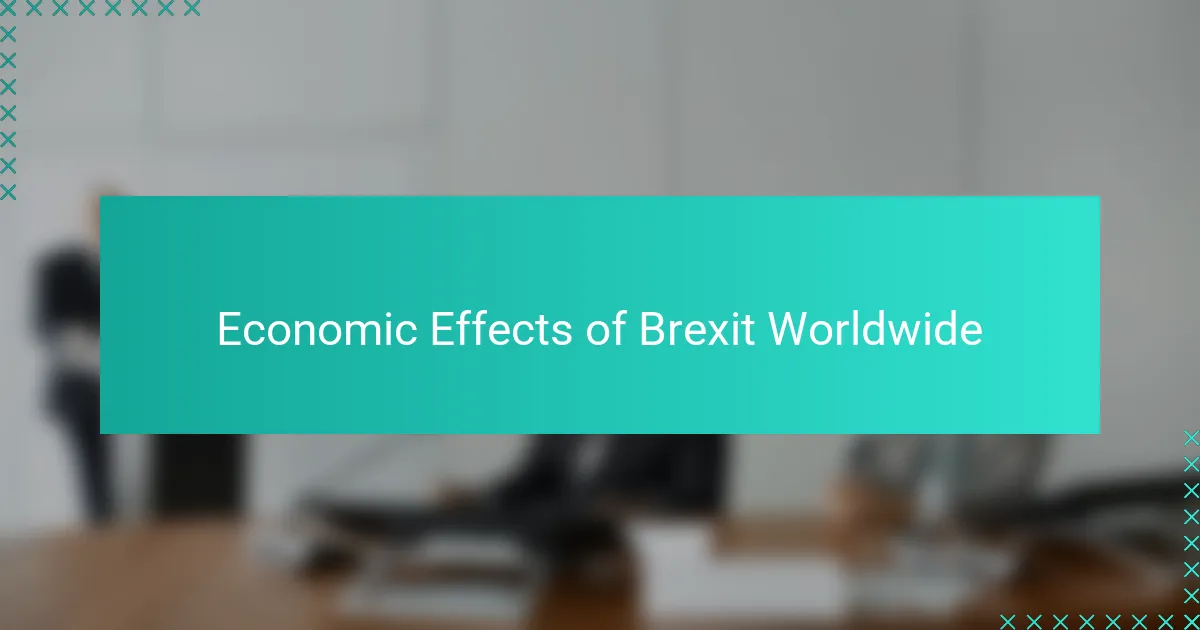
Economic Effects of Brexit Worldwide
The economic effects of Brexit have been anything but contained within the UK or Europe; in my experience, markets from Asia to the Americas felt the tremors almost immediately. I recall watching how currency fluctuations and trade uncertainties caused businesses worldwide to pause and reassess their supply chains. It made me realize just how interconnected our economies truly are—when one major player steps back, everyone adjusts their moves.
What struck me most was the impact on global trade patterns. From my discussions with colleagues in international finance, it became clear that the redirection of trade routes and the emergence of new tariffs reshaped competitive dynamics far beyond British borders. Do these shifts signal a new era of protectionism, or are we witnessing a complex recalibration toward diversified partnerships? Based on what I’ve seen, the answer isn’t straightforward—it’s a messy, evolving landscape.
Then there’s investment confidence, a factor often overlooked but crucial. I remember a business forum where several CEOs expressed cautious optimism yet acknowledged lingering doubts about regulatory stability post-Brexit. This ambivalence, I think, echoes across many global markets, slowing down capital flows and innovation initiatives. It’s a vivid example of how political decisions can cast long economic shadows that stretch well beyond their immediate geography.
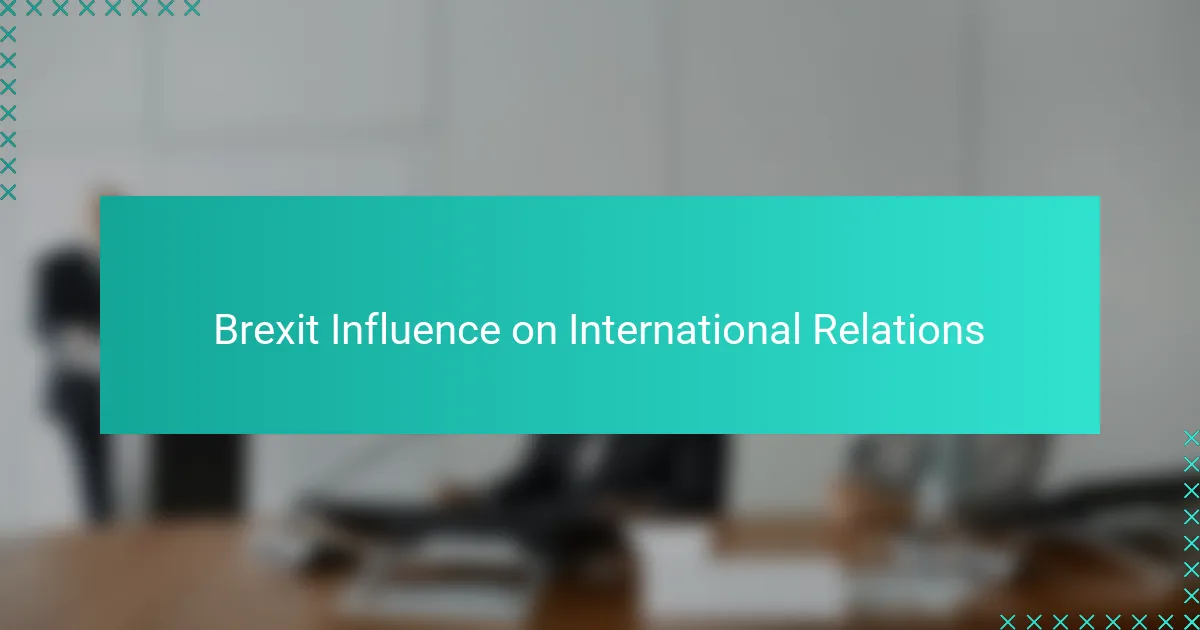
Brexit Influence on International Relations
Brexit undeniably reshaped the landscape of international relations, forcing countries to rethink their diplomatic strategies. I recall a heated debate with a former diplomat, who pointed out how the UK’s exit compelled not only Britain but its partners to recalibrate their expectations and alliances. Doesn’t it make you wonder how permanent such shifts are in a world that’s always in flux?
What struck me most was how Brexit exposed vulnerabilities within traditional alliances. The EU, once perceived as a rock-solid politico-economic bloc, seemed less cohesive in its global stance. I’ve often reflected on whether this fragmentation weakens collective bargaining power or, paradoxically, pushes members to innovate new, more flexible forms of cooperation.
At the same time, Brexit gave rise to a renewed dialogue about sovereignty and national identity on the world stage. I’ve seen leaders from other countries invoke similar rhetoric, which raises a critical question: can prioritizing national interests peacefully coexist with the demands of global collaboration? From my perspective, the answer lies somewhere in balancing assertiveness with openness—a delicate dance that defines diplomacy today.
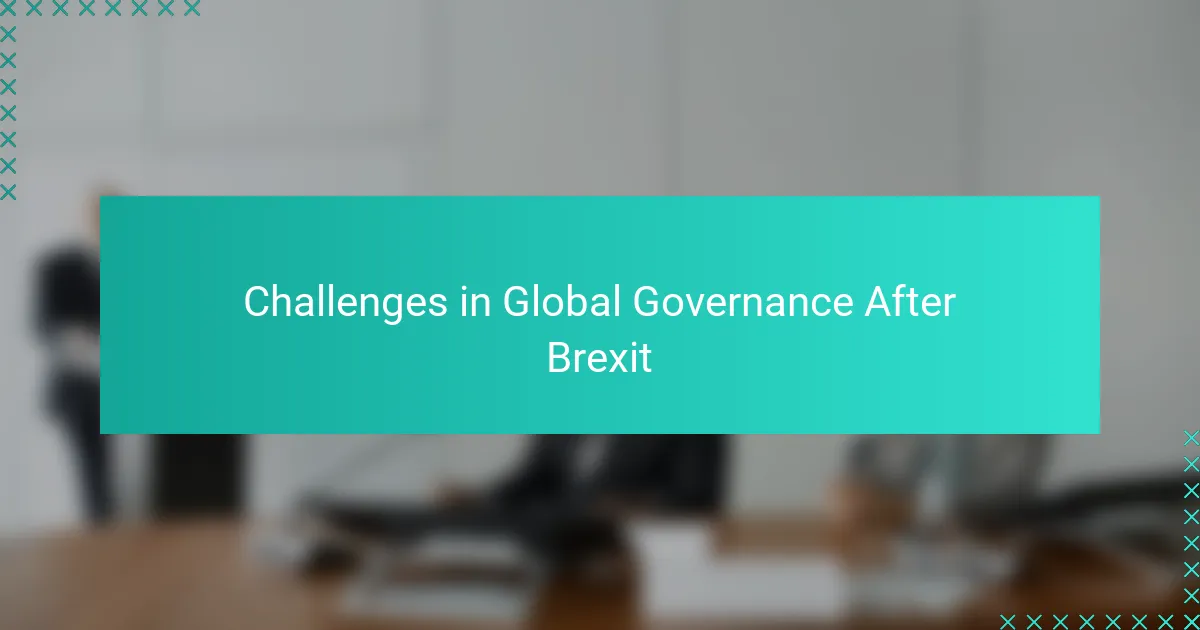
Challenges in Global Governance After Brexit
Navigating global governance after Brexit feels like trying to steer a ship through foggy waters. I’ve witnessed firsthand how the absence of the UK within EU institutions complicates consensus-building, slowing down urgent decisions on climate action and security. It makes me wonder: can international bodies maintain their effectiveness when major players recalibrate their commitments?
One challenge that really struck me is the growing tension between national sovereignty and collective action. I recall a conference where delegates passionately debated whether prioritizing national interests undermines the very idea of multilateral cooperation. Is it possible, I ask myself, to find a middle ground that respects autonomy while fostering strong global governance?
Moreover, Brexit seems to have emboldened fragmented alliances rather than consolidated ones. In my conversations with political analysts, the recurring theme was uncertainty—without the UK’s influence as a bridge-builder, are we drifting toward rival blocs or new coalitions? From what I’ve observed, the challenge now is not just coordinating policies but rebuilding trust amid shifting loyalties.

Personal Insights on Brexit Outcomes
Looking back on Brexit’s outcomes, I find it fascinating how deeply it has altered not just policies but mindsets. I remember feeling both hopeful and uneasy as the dust settled—hopeful that the UK might craft a new global role, uneasy about the uncertainties this unleashed. Have you noticed how such a political pivot can stir a subtle undercurrent of both opportunity and risk across the international scene?
What really stands out to me is how Brexit’s aftermath revealed the fragile balance between independence and interdependence. I once chatted with a UK-based colleague who described the tension perfectly: the desire for sovereign control clashing with the undeniable ties that bind countries economically and diplomatically. It made me realize that Brexit isn’t just a policy change, but a profound challenge to the idea of globalization itself.
At the same time, I can’t help but wonder about the human side of these sweeping changes. Behind every negotiation and headline, there are lives impacted—families weighing their future, businesses recalibrating strategies, and citizens grappling with identity shifts. From my perspective, the personal stories interwoven with Brexit’s global effects are what truly bring its outcomes to life.

Practical Lessons from Brexit Experience
One practical lesson I gleaned from Brexit is the importance of clear communication in managing complex political change. I recall talking to friends in the UK who felt blindsided by how quickly information and consequences unfolded. Hasn’t it become clear that when governments handle such pivotal decisions, transparency and dialogue aren’t just nice to have—they’re essential to maintaining public trust?
Another point that strikes me is how Brexit highlighted the need for flexibility in international agreements. I’ve seen how rigid treaty structures struggled to adapt to the unexpected turn of events, causing delays and confusion in trade and diplomacy. It makes me wonder: wouldn’t designing more adaptable frameworks help nations better navigate political upheavals without throwing the whole system into chaos?
Finally, Brexit taught me that economic interdependence remains a powerful force, even amid political shifts. From conversations with business leaders, I noticed how companies quickly look for practical solutions to keep goods and services flowing, regardless of the political noise. Isn’t that a reminder that, often, pragmatism on the ground can outpace political narratives, driving cooperation in unexpected ways?
